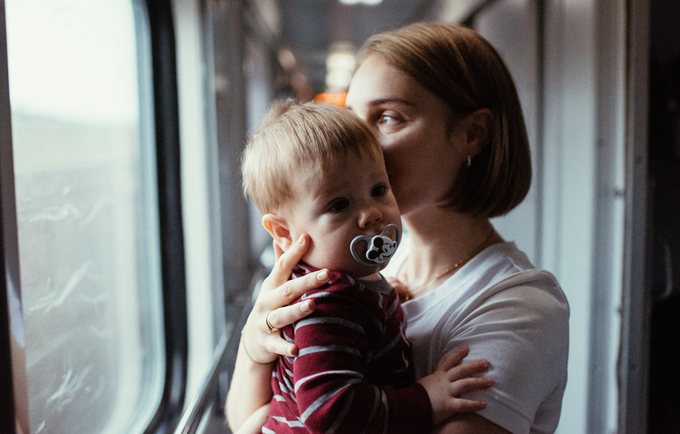
On November 5, a direct train was launched from Kyiv to Chisinau. For the first time in 24 years, the two capitals are connected by a railway line. Moldova became one of the first countries to accept Ukrainian refugees — more than 700,000 people have come to Moldova since the beginning of a full-scale war in Ukraine. More than half of these refugees are women. The launch of the train made it possible to make the route from Kyiv to Chisinau safe and convenient for children and women who, with the onset of a hard winter, are forced to leave their homes in Ukraine.
Difficult decision
The train from Kyiv to Chisinau leaves at five o’clock in the evening — on the platform, in the dim lamp light, passengers are saying goodbye and embracing before parting. Many of those who leave Kyiv will not return home soon, as Ukrainians face a tough winter ahead, and families have to make the difficult decision to leave Ukraine.
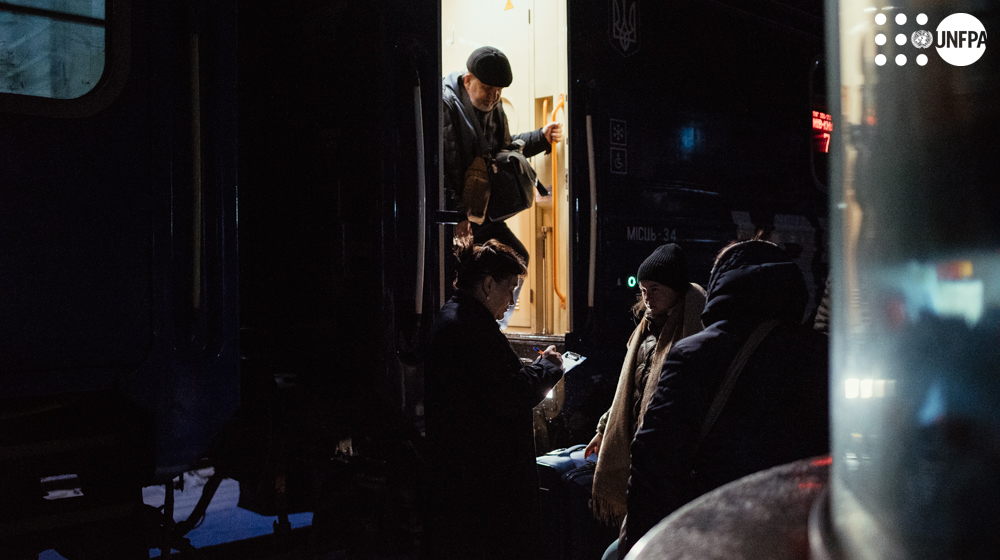
A train conductor checks the boarding tickets before letting passengers into the train carriage
The conductors check the passengers’ tickets, and soon afterward, the train starts moving. Through the duct-taped windows, we watched as those outside were waving at the train. The windows are sealed in case there is an explosion from a Russian missile near the cars — in this case, there’s a chance the glass will hold. Larisa, a conductor in one of the cars, evacuated people from Kramatorsk, a city in the Donetsk region, at the beginning of the full-scale war. Her last train trip to Kramatorsk was on April 8. On that day, the Russian army fired a rocket at the railway station, which killed many civilians who were waiting for the evacuation.
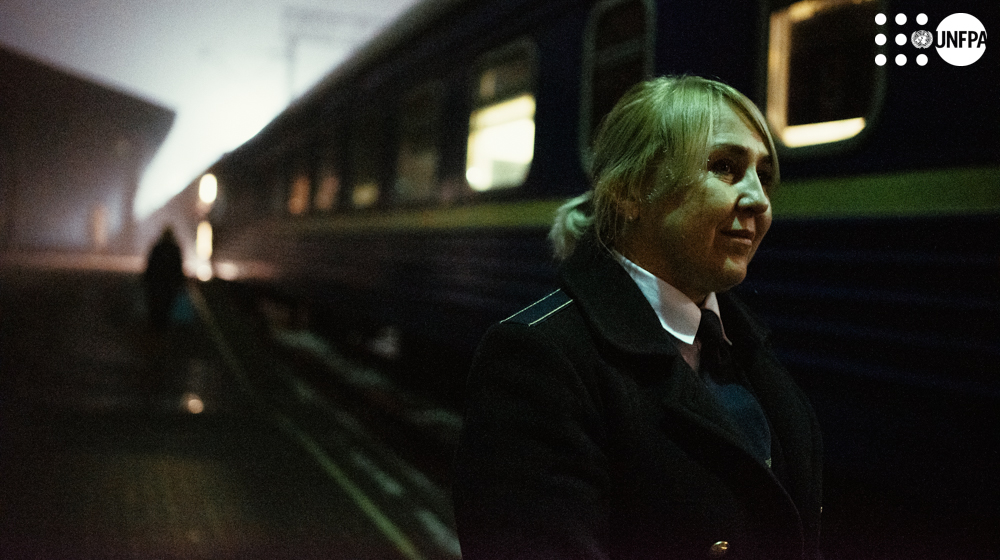 Larissa is a conductor and one of the veterans of the Ukrainian Railway
Larissa is a conductor and one of the veterans of the Ukrainian Railway
Larisa has blonde hair. She talks to us like we’re old friends. Without a trace of a smile, she spoke about what the first months of the full-scale war were like:
— On February 24, our entire team of guides remained at work. We all worked non-stop, of course. We spent weeks taking hundreds of people out of Kramatorsk and Kharkiv — most of them simply slept in aisles between the compartments, and they left their things and their luggage at the stations. Women and children were a priority for us — they were the first to board a car that had at least some free space. We tried to support and care for them.
Larisa recalls that she had no fear.
— Our team consists of conductors who have been working on the railway for many years, and we just tried to keep doing our job. I think what helped me pull through was the realization that I was in the right place and doing the right thing. I didn’t cry much during those days.
After a while, the work of the conductors continued to be physically and morally difficult.
— Many of our railroad workers are now in the field, and there are wounded and dead. We continue to work. Women and children are still leaving for Moldova via our train — people see how hard this winter is, and they are simply forced to leave their homes to find new ones.
Leaving
The train gives hope to many passengers — a young guy and a woman are brought into Larisa’s car at one of the stations. Her name is Tatyana. Her son is a military man who was seriously wounded at the front.
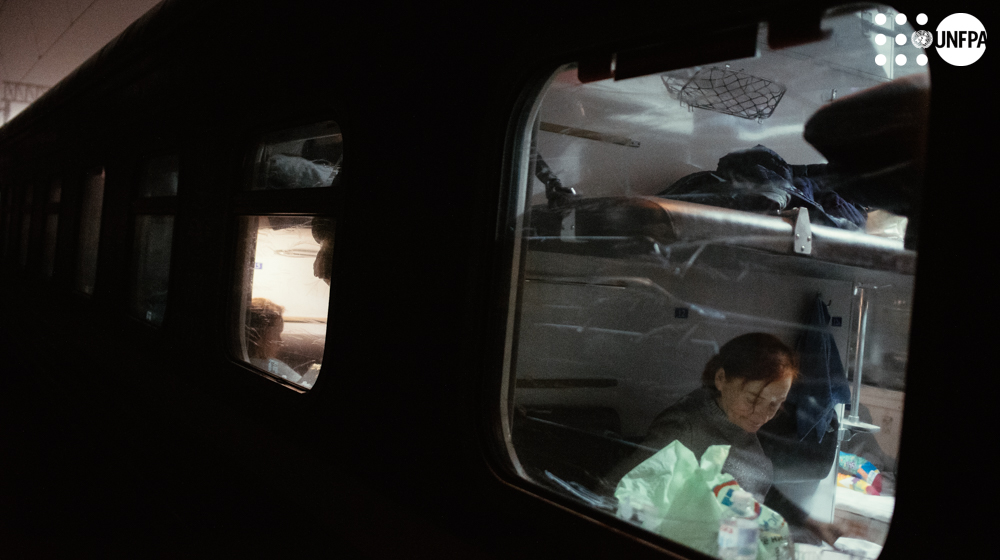
People in the carriage of the train “Kyiv – Chisinau” at the station “Zhmerinka” waiting for the continuation of the route
Tatyana enters our compartment alone — her son feels depressed and cannot talk to anyone. He was left to himself in an empty compartment, with his head wrapped in bandages. Larisa brings tea with a smile on her face, caring for Tatyana and speaking to her like a relative. Tatyana confesses to us that their family is now going through a difficult period — her son is only 23 years old, and now they are traveling together through Moldova to Turkey so that the local doctors can operate on him.
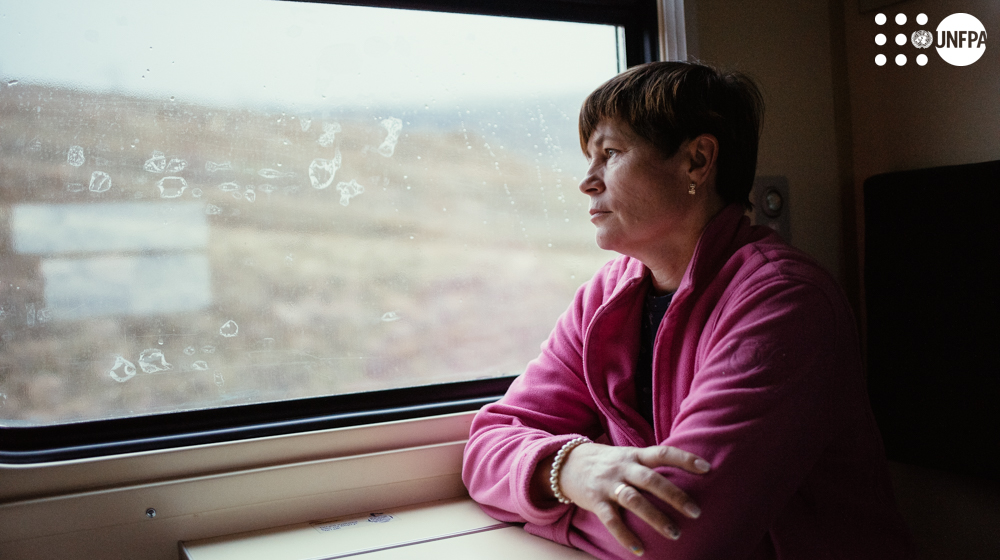
Tatiana is the mother of a soldier who lost an eye in the war. They are now on their way to Moldova to fly from there to Turkey, where her son will have an operation
— We have already lost one eye, but there is a chance to save the second one. We decided that we needed to get treatment in another country.
Tatyana says that while her son was at the front, he tried to write to her every day. By the end of October, though, a lot of the messages he received remained unanswered for a long time. That’s when Tatyana received a call from her son’s commander who said that he was wounded.
— My husband and I went to look for him — we still did not know what kind of injury he had and which hospital he was sent to. We searched and called everyone, and when we found him, he was already in intensive care after the operation. The doctor said that God has big plans for my son — almost no one survives with his injuries. For me, the greatest happiness was to learn that he survived. While I was caring for him in intensive care, I became friends with some of the mothers who also took care of their sons. After a while, these women came to the hospital in black headscarves. Their sons were no more.
Tatyana’s son is already receiving psychological support, but Tatyana herself is not yet ready to seek help: “For me, my child comes first.”
— He is kind and strong. A stand-up person, in the best sense of the word. And he will live.
She starts to cry.
The painful hope
The train we are on has seven carriages, each of them a separate world, a story of pain and hope, a story of a stolen childhood, a different kind of childhood.
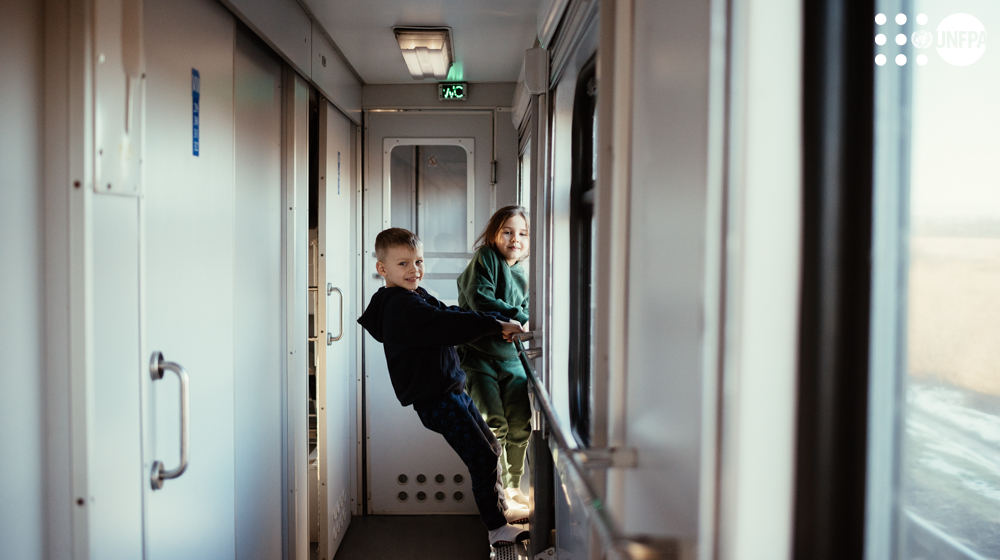 Leonid and Daryana, explore the carriage on the approach to Kyiv
Leonid and Daryana, explore the carriage on the approach to Kyiv
In the next carriage, children’s laughter can be loudly heard — children are playing and watching cartoons while their mothers chat and prepare for their arrival in Chisinau. Marina and Violetta are friends. Each of them has two children: older daughters and younger sons. They had already left Ukraine for Europe at the beginning of the full-scale war, but after a while, they returned home. Now Chisinau is their final destination, where they decided to spend the winter.
Marina says that she and her husband made a decision to leave for a long time.
— We knew that the winter would be hard. But after the latest attacks on the infrastructure, everything has changed — we have small children, and we cannot risk their health and lives. After another rocket attack on Kyiv, we had no electricity and water at home for a long time. Children need comfortable conditions. My son immediately caught a cold when the temperature in the house dropped. We hope Chisinau will not only be safer, but also warmer.
Violetta, Marina’s friend, agrees on how difficult it was to agree to leave.
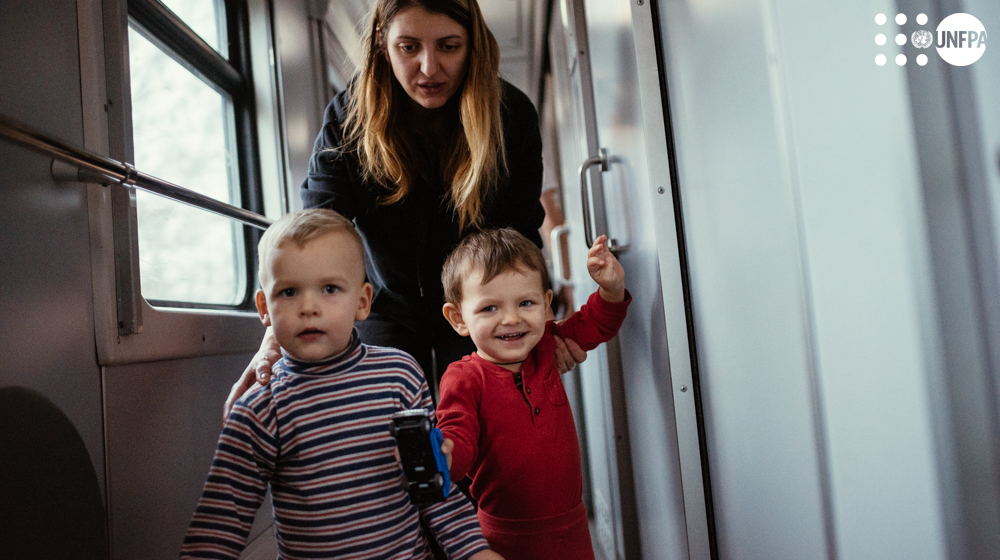
— Our families will now be separated, which is difficult for us. It is difficult to be far from relatives and in another country. We already went through this spring. We still do not know what to expect, how to deal with the children’s education, how to settle down. But the main thing now is that we are safe.
Julia, a young mother from an adjacent compartment, is also moving to Chisinau with her little son named Vlad.
— My son was born on the second of March, a week after the start of the war. Then the military was assigned to our maternity hospital to protect us if the Russian army entered Kyiv. It was scary in those days, we heard explosions. But five days after Vlad was born, we left for western Ukraine, where it was safer at that time. It was hard for me there, I wanted to go home, so we returned home to Kyiv in May. I am not afraid of being separated from my husband. He worked abroad for a long time, so we’d been separated for a while even before the war. What frightens me more is that my son’s whole life goes on during a war — he is a child of war. And we don’t know when it will all end. Vlad is a little afraid of men. Ever since birth, he’s only been surrounded by women.
While we are talking, Vlad smiles, reaching for the photographer’s camera to play with it.
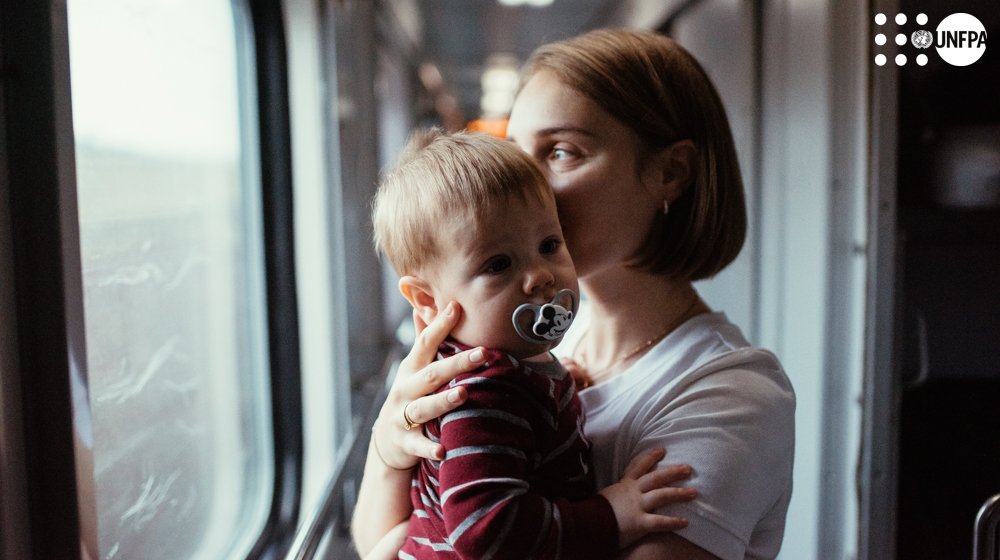
Yulia, a young mother from Kyiv, also moves to Chisinau with her young son named Vlad. Vlad was born a week after the war began
Children are confidently walking through the car, looking out the window with curiosity and almost never acting up. On the day when the young mothers and their children arrived in Chisinau, Kyiv was again fired upon by Russian rockets. The women anxiously tried to establish a telephone connection and write to their relatives to see if they were all right.
Reaching the Safe Space
After 18 hours of travel, the train arrives at the Chisinau railway station – the final station. Kyiv colds are replaced by the southern warmth of Moldova. Arriving passengers are met by Pavlina, the manager of UNFPA Railway Station Safe Space. Pavlina offers psycho-social support to refugees from Ukraine and oversees the work of the team at the UNFPA Safe Space, a facility set-up by UNFPA Moldova as response to the humanitarian needs of the refugee population. Pavlina intimates how much Safe Space is needed for incoming refugees from Ukraine.
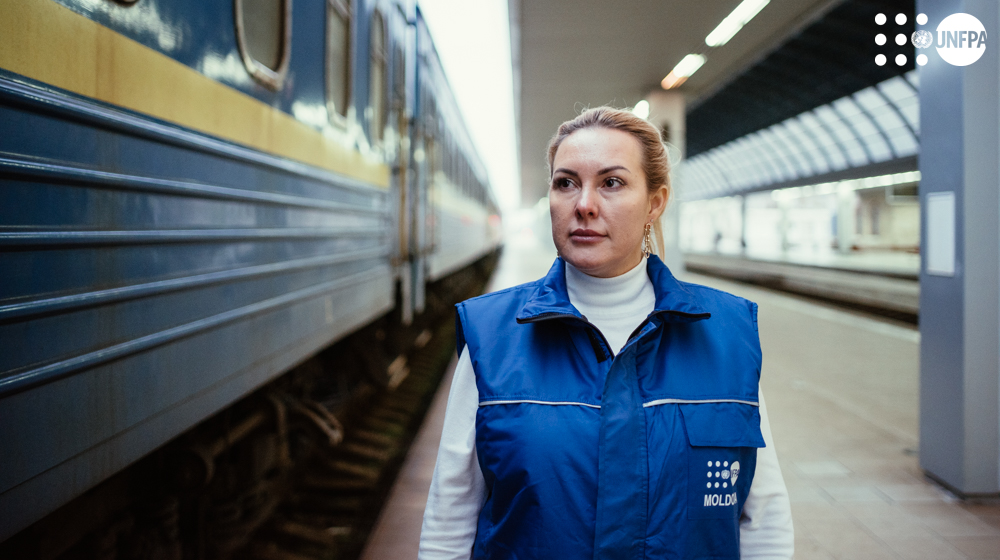
Paulina – UNFPA Railway Station Safe Space Manager
— A woman, at least for a short time, needs to feel safe to collect her thoughts and think her decisions through. You need to provide the person with first aid, first care, information. Even a cup of tea helps a person to relax. The Safe Spaces inform refugees about all areas of our services. We distribute essential packages – Dignity Kits. We coordinate and help refugees who have just arrived from Kyiv to Chisinau. UNFPA’s rich experience has allowed us to quickly set up algorithms for solving problems.
Since 67% of refugees from Ukraine are women, the risk of gender-based violence remains high. Women require reproductive health and crisis prevention services. UNFPA takes measures to address gender-based violence and provide reproductive health services by working with international and local partners in Moldova. Refugee women need
to be assured that they can access life-saving services – medicine, psychosocial support, legal services.
Since February 24, Pavlina has been helping Ukrainians. She started by helping refugees on the Moldovan-Ukrainian border, and then continued her work in Chisinau.
— My parents are Ukrainians, and I am Ukrainian, and now I consider it my duty to help my native country where I can be most useful.
Pavlina is the leader of a team that also includes a social worker and a psychologist involved in helping women and children.
Pavlina recalls how different people needed help in different situations.
— When the train arrived from Kyiv, I saw a girl come out onto the platform — confused, with a large suitcase and tears in her eyes. I approached her and told her about our services. After that, I brought her over to us for coffee. We began to talk, and she burst into tears. She said that her husband stayed in Kyiv, and she was going to Tbilisi to her parents.
The UNFPA team helped the girl by handing her a package of essentials, listening to her, and offering psycho-emotional support.
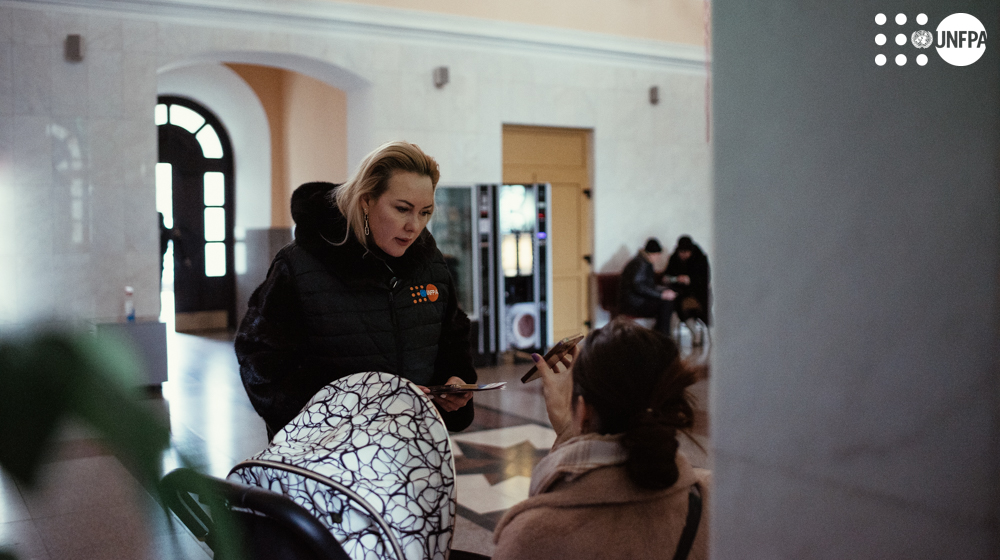
— We didn’t ask too many questions. When she calmed down, she came to her senses and later admitted in a conversation that she was pregnant. We exchanged contacts with her. After a while, she wrote to me from Tbilisi, saying that she arrived safely and met up with her parents. She asked where UNFPA is located in Tbilisi. I sent her the address, and the next day she said she was bleeding. The girl lost her child due to anxiety, nerves and stress. We still keep in touch.
Pavlina has also clarified that the organization helps all categories of people — women, children, and older persons.
— One day, when the train arrived, we met an older woman. I approached her, and we got to know each other. I told her about our services and invited her to come to us where it was warm. It turned out that she was an employee of a scientific institute in Kyiv and came to Chisinau to decide if it was worth moving here. Since Safe Spaces also help older people, we listened to her and supported her, as well as provided relevant information. It was important for her to understand how to settle down in a new city. After that, she walked around Chisinau, and in the evening, before the train to Kyiv was set to depart, she came to us and said that she’s now considering the prospects of moving to Chisinau. She knows that now she has someone to turn to.
In Kyiv, like in Chisinau, there is a place where women and girls can receive care. “Vilna” safe space focuses on the psychological and physical health of women and girls.
Alexandra greets us at the reception in a bright, home-like office. Sunlight pours in through the wide windows, with a coffee aroma emanating from the kitchen.
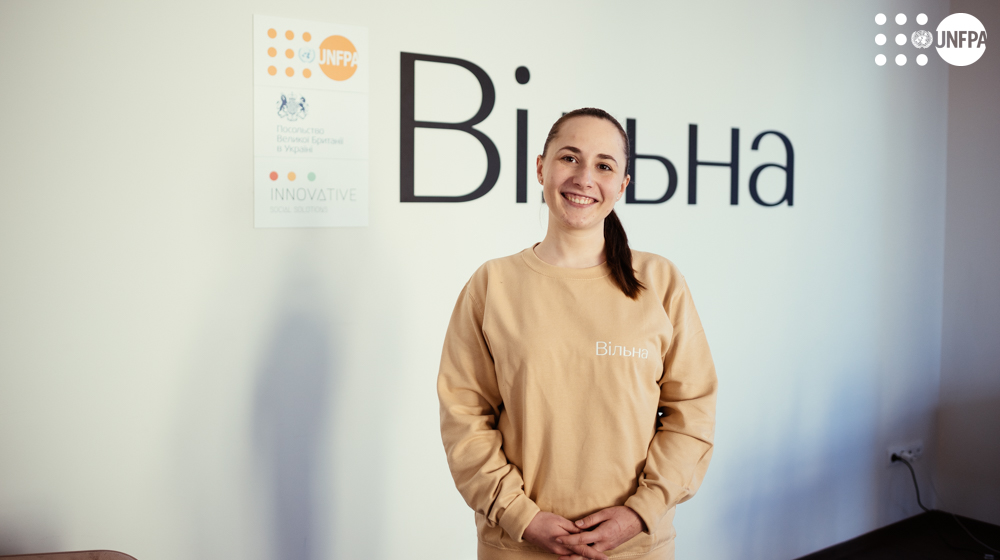 Maria is the coordinator of the “Vilna” project
Maria is the coordinator of the “Vilna” project
Maria, the project coordinator, is happy to see “Vilna” look so cozy. She smiles and is happy to talk about her work.
— It was important for us to create a space where women would feel relaxed and safe, as if you were visiting friends. Quite a bit of time has passed since we opened, but we have already managed to hold a lot of events — of course, many people need psychological support in difficult times, but it’s also useful to simply distract yourself from your problems. People come for psychological help with different requests, and we try to help everyone. We have both individual and group sessions. For example, in Sumy, “Vilna” helps internally displaced people — the Sumy region suffered greatly at the beginning of the war, and people there still need help.
Maria is happy to talk about her goals for the future — “Vilna” plans to help teenage girls in sexual education and women in career growth and unlocking their potential.
— People of all ages come to us — both small children and seventy-year-old women. Alexandra, who is the first to greet these women, finds an individual approach of caring for each person. She offers whatever is suitable for that particular woman — physical, artistic, meditative activity. We want to take care of women, help them and be there for them.
The location benefits from uninterrupted communication and light — in a time when Kyiv is often left without electricity, you can always come to “Vilna” for warmth and light.
The way back home
The train departs from Chisinau to Kyiv at 17:45. Until recently, the train ran every two days, but its schedule was changed for the Christmas and New Year holidays to run daily. People travel by train between the two capitals every day to celebrate the holidays with their families.
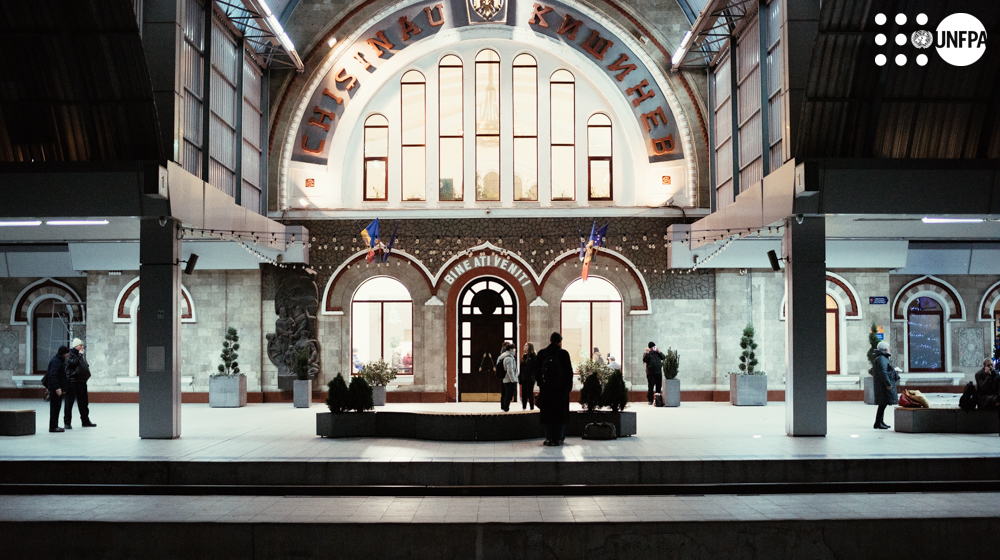 Chisinau railway station buildings
Chisinau railway station buildings
People are gathering on the platform of the Chisinau railway station. With heavy bags in hand, they head to a blue train with yellow stripes – the color of the Ukrainian flag. Twilight outside the window gives way to a dark evening. When the train leaves Chisinau for Kyiv, Victoria, the train’s conductor, begins to feel uneasy. Returning to Ukraine reminds her of the most terrible time in her life — Victoria spent a month in Mariupol.
Victoria has a soft voice. She has been a conductor for 34 years. Until 2014, she often traveled from Mariupol to Moscow and St. Petersburg. After 2014, Kyiv became her frequent route. On February 24, she arrived on a morning train from Kyiv to Mariupol.
— We arrived that morning, and people flocked to the cars. There was panic at the station, the platform was crowded. I myself am from Luhansk, and I thought it would be like it was eight years ago — they would fire a few shots and calm down. But everything ended differently.
FOR THE MOST IMPORTANT NEWS, FOLLOW US ON TELEGRAM!
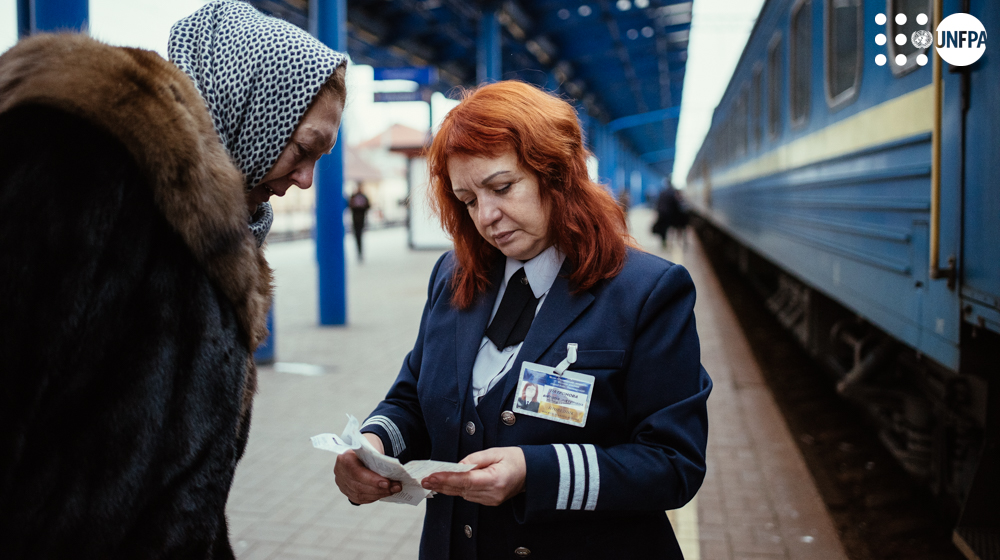 Victoria checks a passenger’s boarding pass at a train station in Vinnytsia
Victoria checks a passenger’s boarding pass at a train station in Vinnytsia
Victoria cries when she remembers Mariupol. Together with her husband, they lived in Mariupol before the war, and spent all of March in the city under constant rocket, artillery and air attacks from the Russian army. What other people saw on the news, Victoria and her husband saw with their own eyes. Only at the end of the month did they manage to leave for Ukrainian-controlled territory.
— While we were in the city, my husband would watch through the window as our neighbors were burying their relatives in the courtyard. They had to dig graves for several days due to constant shelling. My husband and I walked out of the city under shelling. I remember the face of a murdered young man who was lying not far from the road. It all still flashes before my eyes every day. And I hear explosions.
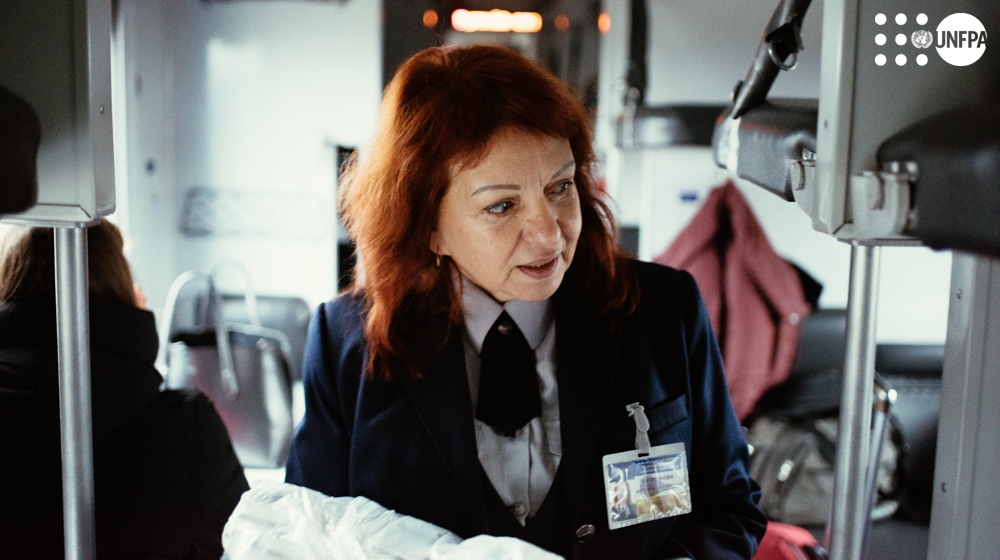
Victoria delivers the bedding to the passengers
We chat with Victoria in the conductor’s cabin, where they prepare tea and coffee for passengers. The tragedy of Mariupol seems distant and painful, which is hard to talk and think about. More than three hundred days have passed since the beginning of the full-scale war, but no one has been able to accept and understand it. After leaving the city, Victoria could not feel safe. When she walks down the street, she tries to walk closer to buildings — open spaces scare her.
I ask Victoria what helped her survive and get out of Mariupol.
— I thought we were going to die. I think that my husband and I helped save each other. We always help each other, work together, and live together. Everyone needs another person in their life.
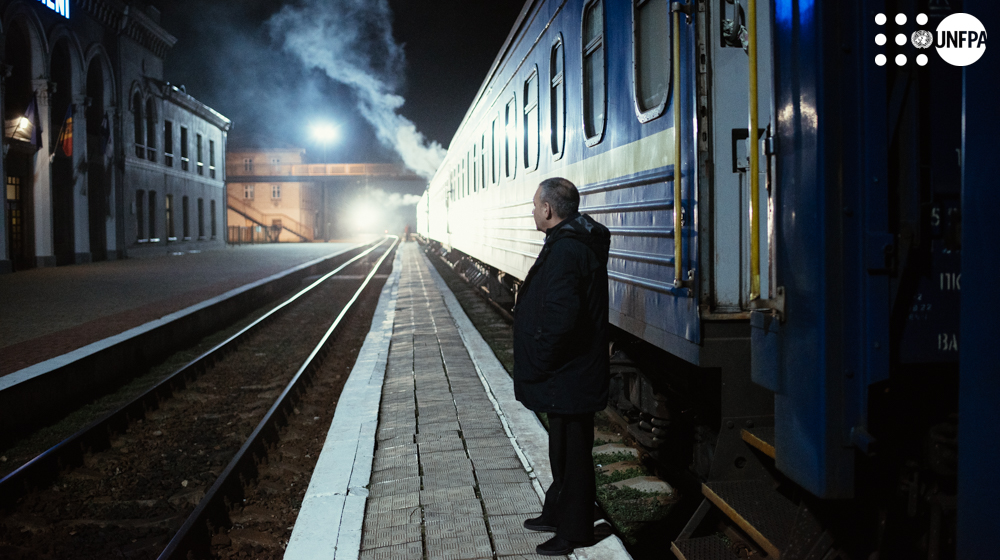
Ungheni is the first stop on the road to Kyiv
Now Victoria and her husband live in a hostel provided by the Ukrainian Railways. They now call this place home: “It’s a force of habit.” Our conversation is interrupted by a station stop in Vinnitsa. Victoria greets passengers, offers them tea, and carries bed linen along the swaying corridor of the car.
A train conductor is someone who not only checks passengers’ tickets, but also takes care of their comfort while en route. Order, clean bed, hot coffee — all this is provided by the conductor. With the onset of a full-scale war, their work became more difficult. Evacuation trips and travel delays due to shelling of energy infrastructure force conductors to be on the road almost constantly.
In the next car, Inna and Yulia are traveling with their children. They are friends heading back to Kyiv. We were introduced to them by Pavlina, who met them at the railway station in Chisinau, when the girls came from Kyiv to Moldova.
Yuliya, 29, smiles, speaks softly and tells us that she had previously experienced war in 2014, when she lived in her native Donetsk. She had to leave the city because of the war and start her life over again. Together with her husband, she moved to Kyiv, and after a while, she gave birth to a daughter, Dariana. Until February 24, Julia assumed that a full-scale war could begin.
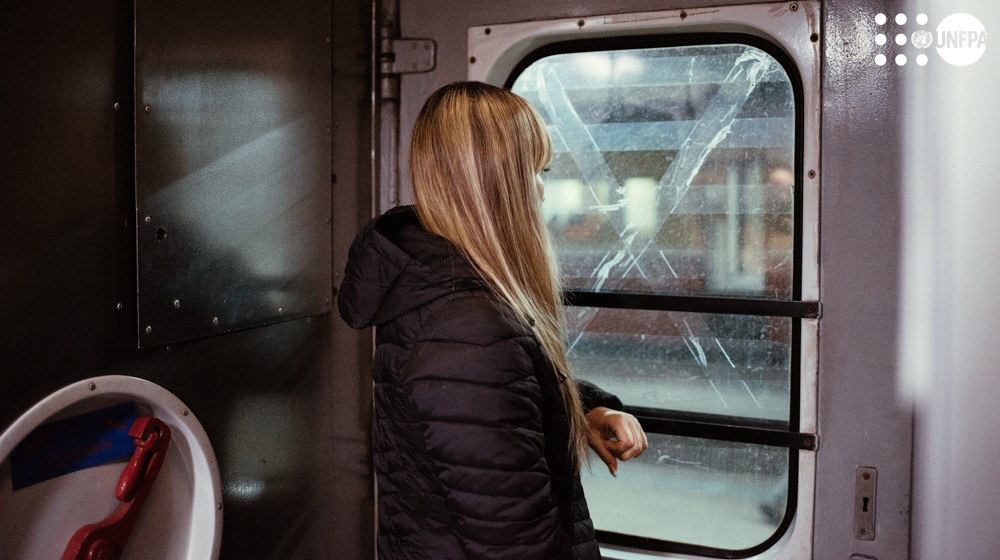
— Before the New Year in 2021, I watched TV — rather than showing a story about fairs and how to choose gifts for children, they showed one about how to pack a go bag. It really left an impression on me then. On February 24, I was in the hospital and heard explosions early in the morning. War had begun. The hospital began to panic. I called a taxi and was only able to get home to my daughter two hours later. The next morning, a rocket flew not far from us. The house shook, the windows cracked and a bright glow, like a flash, lit up. We slept in the bathroom for the next week. The basement of our house is unreliable and dangerous — it is cold and damp there. I made a shelter for us in the bathroom, where me and my daughter, along with our dog, would hide from explosions.
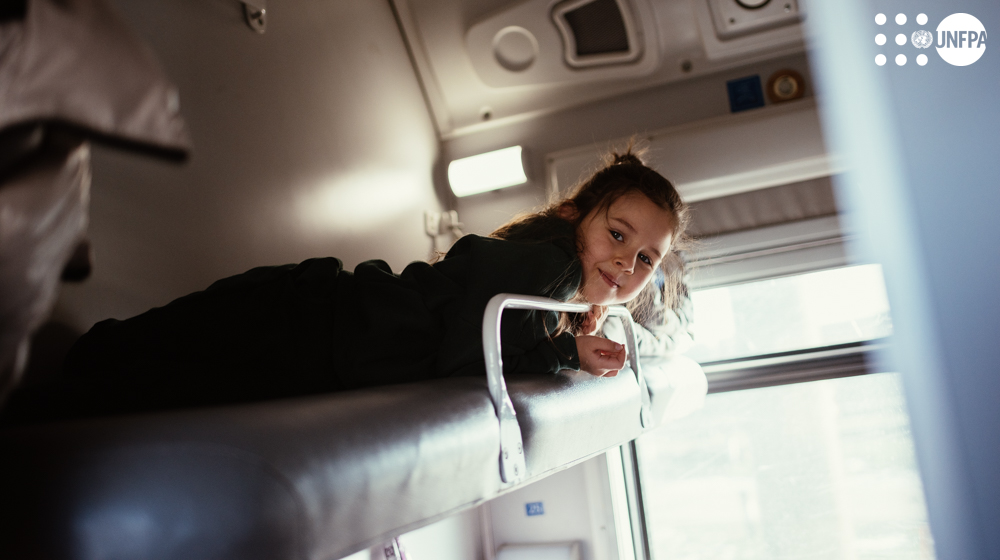
Even now, if something makes a noise, my six-year-old daughter and the dog would hide in the bathroom.
Yulia says she did not want to leave Ukraine — despite the war, she felt safer at home than in another country. Together with her family, she went to the Cherkasy region, where they stayed until April. After Yulia and her daughter ultimately left Ukraine for Bulgaria, they soon returned. Julia couldn’t bear to be parted from her husband and for her parents.
— Our Ukrainian women often cannot find a place for themselves in another country. For example, back home, she would be an experienced doctor, while she has to work as a maid abroad. Therefore, many women decide to return home, where they can work in their field. We are all grateful to the countries that help Ukraine and Ukrainians. Without their help we would not have managed. East or West, home is best.
Yulia is considering leaving Ukraine in the winter for the sake of her child.
— When I am in Kyiv, I am calmer than when I am abroad. All my loved ones are back home, and if something happens, I can keep close by and help them.
Inna is ten years older than Yulia. She, too, felt the approach of war — she wanted to have a plan and be ready for anything. A few days before the start of the war, Inna stocked up on water and food.
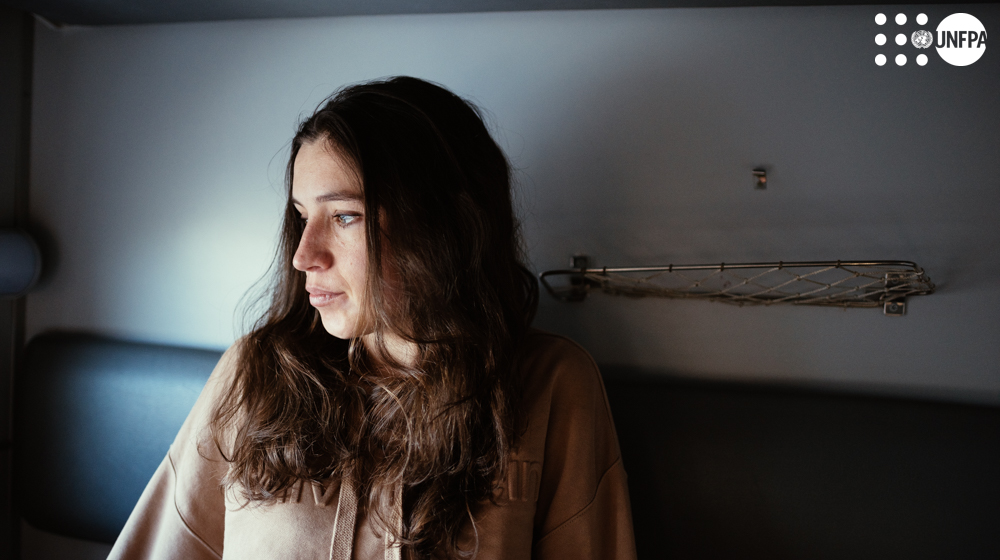
Inna, after all she’s been through, she’ll be home very soon
— On February 24, we, like everyone in the country, woke up from explosions. Our house is along the road to Irpin and Bucha, and by then the Russians had already been close to Kyiv. It became clear that if they entered the city, we would be among the first to suffer. Together with my husband and child, we went to a small village in the Zhytomyr region.
Before the war, my husband and I decided to separate, but the war brought us closer again. When we arrived, my husband enrolled into the Civil defense [a voluntary unit near settlements to protect the civilian population]. In the meantime, I began to equip the house’s basement so that we could hide there from the explosions. Rockets flew over us, my son was terrified.
Inna’s friends insisted that she and her son go to Europe. On March 16, they decided to set off — first they reached Lviv, then there was Poland, Austria, and, finally, France, where they spent several months.
— The road was difficult. Most of all, I was worried about my son. It didn’t matter to me whether I slept and ate, the main thing was that my son did. I felt I was in danger in one of the refugee centers. There were men around me acting strangely, and I wanted to leave. They asked if I was married, I saw their interest in me. As a woman with a child who has been on the road, I can confirm what a difficult journey it was. I am a very calm and responsible person, I never cry. But during our time on the road, it was hard for me to hold back tears.
The full material can be read HERE.
UNFPA continues to support 18 Static Orange Safe Spaces across Moldova and six Mobile Orange Safe Spaces to conduct outreach activities targeting the refugees and host communities. Distributing information on GBV including the types of GBV and SRH rights, and information on the available support services for survivors of GBV and groups at risk UNFPA supports Safe Spaces dedicated to women, youth and older persons. Since the start of the war in Ucraine. 16 650 dignity kits were distributed by UNFPA partners, including customized dignity kits for the winter season, as well as dignity kits for boys and older persons.
UNFPA continues to provide technical expertise and support in upgrading seven perinatal centers and two specialized hospitals with lifesaving equipment, namely the delivery rooms, operating theatres, and intensive care units for women and newborns. As of December, modern equipment with a total value of $ 3,400,000 has been delivered to nine health care institutions. With a total of 15 000 beneficiaries – refugee women, new burns, doctors.

